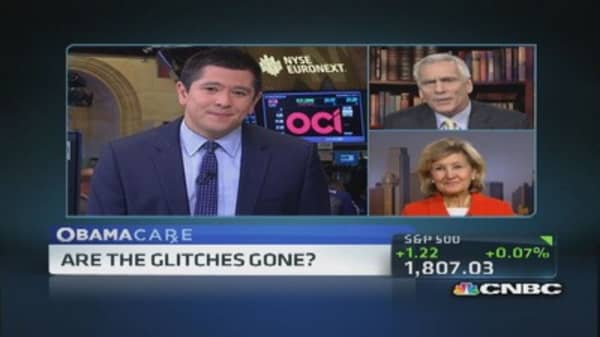We agree with President Obama that the current health-care system simply does not work for many Americans. In addition, expanding access to care for more Americans including those with pre-existing conditions is a laudable goal with which we agree with the president. However, these goals should not be attained by lowering the quality and availability for those who have confidence in the health care they now have.
At the start, any improvements to our health-care system should begin with a basic focus on three core principles: reducing the cost of health care, providing greater access to care and increasing the quality of the care provided. It is important to recognize that, for too long, too many health-care consumers have been separated from the cost of care and thus have no incentive to make the wise choices they would otherwise make as informed consumers.
(Read more: Healthcare.gov fixed? Insurers say no)
Policies such as unlimited health savings accounts to address this problem would go a long way toward reducing health-care spending by the consumer. Additionally, health-care consumers value greater choice in shaping their own individual needs. Forcing people into exchanges that dictate the type of care they must receive restrains choice and increases costs. Finally, we should focus on real incentives for medical innovation to help improve the quality of our care. Policies like the new excise tax on medical devices in the health law stifle innovation and frustrate quality.
The past few months have brought a renewed attention to health-care policy. This new focus offers the opportunity to re-engage in debates about health-savings accounts, small business health plans, medical-liability reforms and allowing insurance plans to be available across state lines to provide bigger pools that lower costs. Medicare-reform proposals offered in recent years by members from both parties are a starting point. But, prescriptive requirements such as an employer mandate (or in the alternative an imposition of a fine) restrains hiring and causes businesses to opt-out of plans that are satisfactory to their employees.
(Read more: Obama needs to heed insurer concerns: Ex-HHS chief)
At the beginning of the Obama Administration, then-White House Chief of Staff Rahm Emanuel famously quipped, "You never want to let a serious crisis go to waste. And what I mean by that is that it is an opportunity to do things that you think you could not do before." The flawed health-care law and its floundering roll-out have created a crisis of confidence and trust. Serious thought leaders and policy makers should seize this opportunity to re-engage the public, lead with solutions, and "not let this crisis go to waste."
— By Kay Bailey Hutchison and Frank J. Macchiarola
Kay Bailey Hutchison is senior counsel at Bracewell & Giuliani LLP. She served as a U.S. senator (R-Texas) from 1993-2013.
Frank J. Macchiarola, is a senior principal at Bracewell & Giuliani LLP. He served as Republican Staff Director of the Senate HELP Committee from 2009-2013.




